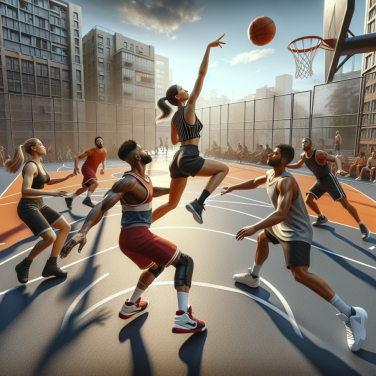The Hidden Advantages: Uncovering the Health and Social Benefits of Recreational Activities
Engaging in recreational activities not only provides a great deal of enjoyment but also paves the way for holistic personal development. While most people are aware of the benefits powered by recreational activities, many still overlook the hidden advantages that these activities offer. This piece seeks to unearth those concealed benefits, emphasizing both health and social aspects.
One of the significant health benefits of participating in recreational activities is the enhancement of physical health. Physical recreation activities such as sports, hiking, swimming or cycling, encourage physical fitness and stamina by improving cardiovascular health and promoting muscular strength. Additionally, they provide a natural remedy for hypertension and other health-related issues.
Research has also pointed out the considerable impact of recreational activities on mental health. Regular involvement in these activities offers a natural antidote against stress, depression, and anxiety. Recreational activities foster relaxation, alleviate stress, and yield happier moods. Moreover, non-physical activities such as painting, knitting or baking can stimulate the brain, thereby boosting memory power and cognitive skills.
In addition to health benefits, recreational activities also boast numerous social benefits. They provide an ideal platform to cultivate social skills, especially in the case of team-based sports or group activities like canoeing or camping. These situations encourage communication, collaboration, and leadership skills, as well as spur a team spirit. They also provide an opportunity to appreciate diversity, promoting cultural understanding and empathy.
Through both friendly competitions and casual engagements, recreational activities can foster meaningful relationships and stronger social networks. They provide unique opportunities to meet and mingle with people from varying walks of life, expanding one's social circle. These social interactions can inculcate essential life skills such as negotiation, problem-solving and conflict resolution.
Furthermore, recreational activities provide an opportunity for community involvement, deepening one's sense of belonging and enhancing collective unity. Volunteering or participating in community recreational events helps to build stronger connections, enriching both the individual and the community as a whole.
Some recreational activities also offer the opportunity to commune with nature. Whether it's hiking in the wilderness, fishing in a serene lake, or camping under the starry sky, these activities provide tremendous physical and emotional benefits. The soothing allure of nature has proven to be a fantastic stress reliever, providing calm and tranquility to a disturbed mind.
In sum, the overlooked advantages of recreational activities paint a robust picture of their necessity in our lives. The rather governed narrative focusing on the 'fun' part of recreational activities often eclipses these more profound benefits.
Read also:
Triathlon Training: Pushing Your Physical And Mental Limits
Diving into the Multitude of Recreational Activities: More than Just Fun and Games
Recreational activities are far more than just enjoyable ways to pass the time. When you venture beyond the surface, you’ll discover that these pastimes encompass an immense array of benefits that span physical, mental, and social dimensions. Let's venture into various types, and uncover the associated advantages that make recreational activities not just entertaining, but also significantly beneficial.
To begin with, let's discuss physical recreational activities. Engaging in sports, hiking, biking, swimming, or any form of exercise-based hobby is an excellent way to maintain physical fitness. Regular exercise can help improve cardiovascular health, increase strength and flexibility, facilitate weight management, and reduce the risk of developing chronic illnesses. Also, an active lifestyle can lead to longer lifespans and higher quality of life.
Furthermore, it's not just the physical benefits that are noteworthy. Participating in recreational activities can substantially enhance mental health. These activities have been proven to reduce stress, alleviate anxiety, and combat depression. The enjoyment derived acts as an effective stress-buster, providing relief from daily pressures. They also stimulate various cognitive processes, resulting in improved concentration, creativity, and problem-solving skills.
Outdoor recreational activities, like camping, hiking, or bird watching, often have a calming effect and can help in restoring mental tranquility. These activities help rejuvenate the senses and boost mood, promoting emotional well-being. The serenity and beauty of nature can also stir spiritual experiences, fostering a sense of peace and inner contentment.
Recreational activities also play a crucial role in socialization. Participating in team sports, joining a club or community group, or attending events and festivals can provide excellent opportunities for social interaction. These activities encourage cooperation, teamwork, and adherence to rules and guidelines. Consequently, they foster a sense of belonging and enhance interpersonal skills such as communication, empathy, and conflict resolution.
Cultural and artistic activities, like theatre, music, and dance, offer additional arenas for recreational endeavors. These activities not only provide entertainment but also stimulate creativity, enhance cultural knowledge, and promote cultural diversity understanding. Furthermore, they can be a medium for self-expression, helping to cultivate emotional intelligence and boost self-esteem.
Lastly, educational recreation, such as reading, attending workshops or seminars, or traveling to historic sites, combines leisure and learning. These activities can increase knowledge, stimulate intellectual curiosity, and promote lifelong learning. By expanding one's perception of the world, they can foster critical thinking and broaden the mind.




